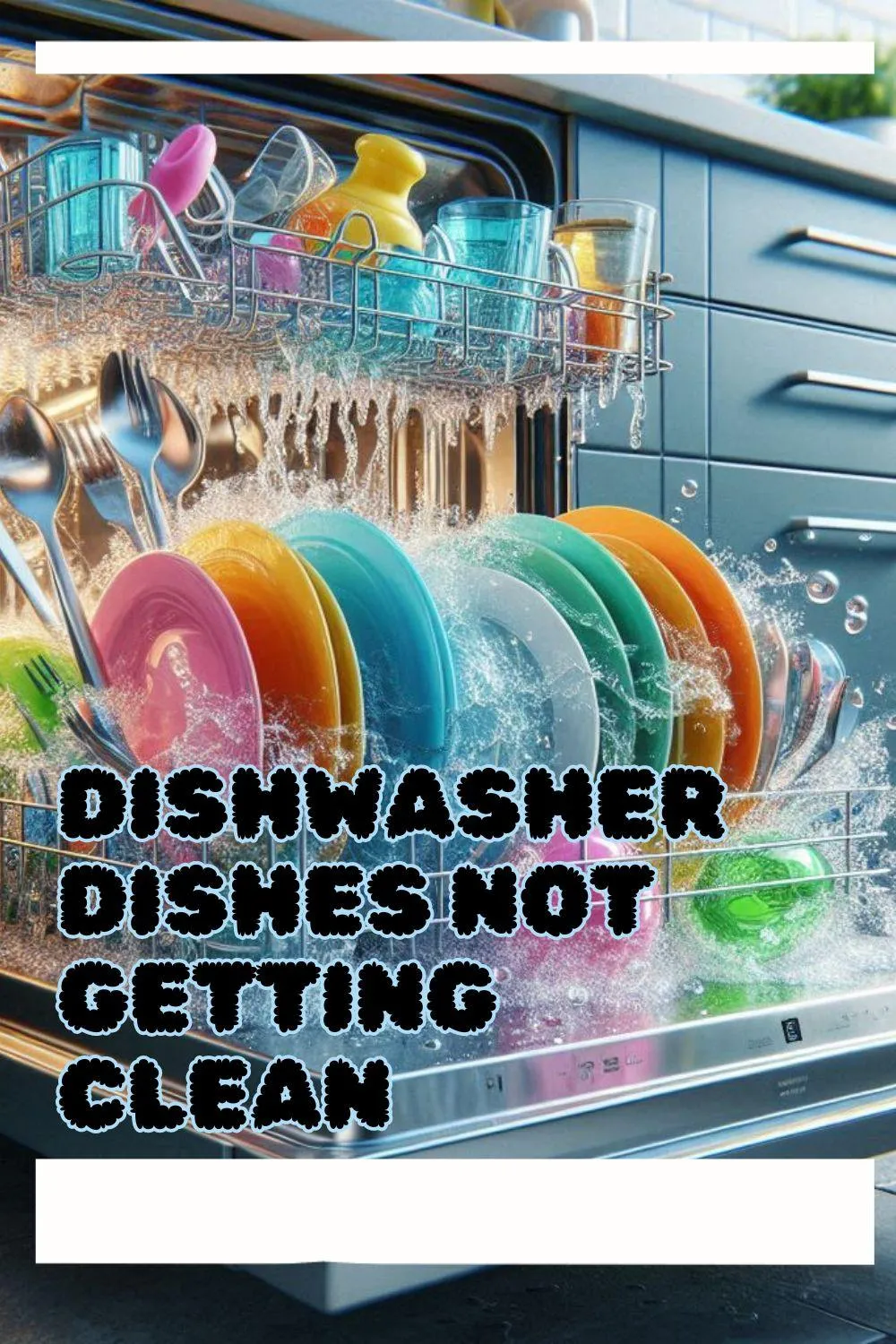Phone: (559) 272-4265
Appliance Repair Tips For Bakersfield, CA Residents

Why Your Dishwasher Dishes Are Not Getting Clean
Struggling with dirty dishes? Understanding why your dishwasher dishes are not getting clean is the first step to achieving a spotless finish every time. - Appliance Boss
Introduction
A dishwasher is a marvel of modern convenience, transforming stacks of dirty dishes into sparkling clean results with minimal effort. However, when your dishwasher fails to deliver spotless dishes, it can be a source of frustration. Understanding why your dishwasher dishes are not getting clean and addressing the underlying issues promptly is crucial to maintaining the efficiency of this essential appliance.
Understanding the Problem: Why Clean Dishes Matter
Clean dishes are not just about aesthetics; they are fundamental to health and hygiene. Residual food particles and grease can harbor bacteria, which can potentially lead to foodborne illnesses. Furthermore, consistently clean dishes enhance the longevity of your dishwasher and ensure that your kitchen remains a welcoming space for both cooking and dining.

Common Reasons for Dirty Dishes
Several factors can contribute to the problem of dirty dishes. Identifying and addressing these issues will help you restore your dishwasher's performance and ensure that each cycle leaves your dishes sparkling.
Clogged Spray Arms: How They Affect Cleaning Efficiency
The spray arms of a dishwasher are designed to distribute water evenly over the dishes. When these arms become clogged with food particles or mineral deposits, the water flow is obstructed. This means that some dishes may not receive adequate cleaning, leaving behind residues and grime. Regularly inspect and clean the spray arms to maintain optimal cleaning performance.
Dirty Dishwasher Filters: The Hidden Culprit
Dishwasher filters are essential for trapping food particles and preventing them from recirculating during the wash cycle. Over time, these filters can become clogged with debris, which can hinder water flow and reduce cleaning efficiency. A dirty filter not only affects cleaning but can also cause unpleasant odors. Regular cleaning and replacement of filters are key to ensuring your dishwasher operates effectively.
Blocked Drainage: Why It Impairs Cleaning Performance
Effective drainage is crucial for the proper functioning of your dishwasher. Blocked drainage systems can prevent dirty water from being expelled, causing it to pool at the bottom of the dishwasher. This stagnant water can mix with fresh water during the next cycle, leading to poor cleaning results. Ensure that the drainage system is clear and free of obstructions to maintain optimal performance.
Improper Loading: Maximizing Your Dishwasher’s Potential
The way you load your dishwasher can significantly impact its cleaning efficiency. Overloading or incorrectly placing dishes can block water and detergent from reaching all surfaces. Follow the manufacturer's loading guidelines to maximize your dishwasher’s potential. Place larger items on the bottom rack and smaller, more delicate items on the top rack to ensure a thorough clean.
Water Quality Issues
Water quality plays a significant role in dishwasher performance. Problems such as hard water buildup or incorrect detergent usage can lead to less-than-clean dishes.
Hard Water Buildup: How It Affects Your Dishes
Hard water contains high levels of calcium and magnesium, which can leave mineral deposits on your dishes and inside your dishwasher. These deposits can cause spots and cloudiness on glassware and reduce the effectiveness of cleaning. Using a water softener or descaling agent can help mitigate the effects of hard water and keep your dishes spotless.
Using the Right Detergent: The Impact on Cleanliness
Not all dishwashing detergents are created equal. Using the wrong type or an inadequate amount of detergent can result in poorly cleaned dishes. Choose a high-quality detergent that is suitable for your water hardness and dishwasher model. Follow the manufacturer's recommendations for dosage to ensure optimal cleaning performance.
Temperature Troubles: Why Water Temperature Matters
Water temperature is a critical factor in the effectiveness of dishwashing. Water that is too cool may not dissolve detergent properly or remove grease effectively. On the other hand, excessively hot water can damage delicate items. Aim for a water temperature between 120°F and 150°F (49°C to 66°C) for optimal cleaning results.
Dishwasher Maintenance
Regular maintenance is essential for keeping your dishwasher in peak condition. By performing routine checks and cleaning, you can prevent common issues and extend the lifespan of your appliance.
Regular Cleaning of Spray Arms: A Step-by-Step Guide
To clean the spray arms, first remove them from the dishwasher according to the manufacturer’s instructions. Rinse them under warm water and use a small brush or toothpick to clear any obstructions from the spray nozzles. Reattach the spray arms and run a short cycle without dishes to ensure they are working correctly.
Checking and Replacing Filters: Keeping Your Dishwasher Fresh
Locate the dishwasher filter, usually found at the bottom of the machine. Remove and rinse the filter under running water to remove food particles and debris. If the filter is damaged or excessively worn, replace it with a new one. Regular maintenance of the filter helps prevent poor cleaning and odors.
Descaling Your Dishwasher: Removing Mineral Deposits
Descaling involves removing mineral deposits that accumulate from hard water. Use a commercial descaling solution or a mixture of vinegar and baking soda. Pour the solution into the bottom of the empty dishwasher and run a hot water cycle. This process helps to dissolve and flush out mineral deposits, restoring your dishwasher’s efficiency.
Dishwasher Components and Their Role
Understanding the various components of your dishwasher and their functions can help diagnose issues and ensure proper maintenance.
The Role of the Detergent Dispenser: Ensuring Proper Function
The detergent dispenser releases detergent at the appropriate time during the wash cycle. If the dispenser is malfunctioning, it can lead to inadequate detergent distribution and poor cleaning results. Check the dispenser for clogs or damage and ensure it opens correctly during the cycle.
How the Pump Works: Understanding Its Impact on Cleaning
The pump circulates water throughout the dishwasher and helps to drain dirty water. A malfunctioning pump can lead to inadequate cleaning and drainage issues. Inspect the pump for blockages and ensure it operates smoothly to maintain effective cleaning.
The Importance of the Heating Element: Maintaining Optimal Temperature
The heating element heats the water to the necessary temperature for effective cleaning and sanitization. A faulty heating element can result in cool water and inadequate cleaning. Regularly check the heating element for signs of wear or damage and replace it if necessary.
Troubleshooting Tips
When faced with dishwasher issues, these troubleshooting tips can help identify and resolve problems.
Identifying and Fixing Spray Arm Issues
If spray arms are not rotating or are clogged, the cleaning efficiency will be compromised. Remove the spray arms, clean them thoroughly, and check for any blockages or damage. Reattach and test to ensure proper function.
Cleaning and Maintaining the Drain Pump
To clean the drain pump, remove any visible debris and check for blockages. Ensure the pump impeller is free to move and that no foreign objects are obstructing it. Regular maintenance of the drain pump helps prevent drainage problems and ensures effective cleaning.
How to Address Low Water Pressure Problems
Low water pressure can affect the dishwasher’s ability to clean dishes effectively. Check for clogs in the water inlet and ensure that the water supply valves are fully open. If the problem persists, consult a professional to assess and repair the water pressure issue.
When to Call a Professional
Some problems may be beyond the scope of DIY repairs and require professional intervention.
Signs of a Serious Problem: Knowing When to Seek Help
If you notice persistent issues such as unusual noises, persistent leaks, or electrical problems, it may indicate a serious underlying issue. If basic troubleshooting does not resolve the problem, contact a professional technician to diagnose and repair the issue.
How Professional Repairs Can Save You Time and Money
Professional technicians have the expertise and tools to efficiently diagnose and repair complex issues. Investing in professional repairs can prevent further damage, save you time, and potentially reduce long-term costs by ensuring your dishwasher operates optimally.
Preventative Measures
Taking preventive measures can help avoid common issues and ensure the continued performance of your dishwasher.
Tips for Preventing Common Cleaning Issues
Regularly clean and maintain your dishwasher to prevent common problems. Avoid overloading and follow proper loading guidelines. Use high-quality detergent and consider using a water softener if you have hard water.
Best Practices for Loading Your Dishwasher
Load your dishwasher according to the manufacturer's instructions. Place larger items on the bottom rack and smaller, more delicate items on the top rack. Avoid blocking spray arms and ensure that all items are properly spaced for effective water and detergent distribution.
Routine Maintenance Schedule: Keeping Your Dishwasher in Top Shape
Establish a routine maintenance schedule to keep your dishwasher in excellent condition. Perform regular cleaning of spray arms, filters, and the drain pump. Schedule descaling as needed and inspect components periodically to address any issues before they become significant problems.
Conclusion
Maintaining a dishwasher that consistently delivers clean dishes involves understanding common issues and taking proactive steps to address them. By following proper maintenance practices and troubleshooting tips, you can ensure your dishwasher performs efficiently and effectively. Regular attention to components like spray arms, filters, and the heating element will keep your appliance in top shape and extend its lifespan.
If you encounter persistent problems or need professional assistance, Zip Appliance and Plumbing Repair is here to help. Our team of experts can diagnose and resolve issues quickly, ensuring your dishwasher operates smoothly. For more information or to schedule a repair, visit our website at www.ziprepairservice.com or call us at (661) 387-2282. Let us keep your dishwasher—and your kitchen—running flawlessly.

Why Your Dishwasher Dishes Are Not Getting Clean
Struggling with dirty dishes? Understanding why your dishwasher dishes are not getting clean is the first step to achieving a spotless finish every time. - Appliance Boss
Introduction
A dishwasher is a marvel of modern convenience, transforming stacks of dirty dishes into sparkling clean results with minimal effort. However, when your dishwasher fails to deliver spotless dishes, it can be a source of frustration. Understanding why your dishwasher dishes are not getting clean and addressing the underlying issues promptly is crucial to maintaining the efficiency of this essential appliance.
Understanding the Problem: Why Clean Dishes Matter
Clean dishes are not just about aesthetics; they are fundamental to health and hygiene. Residual food particles and grease can harbor bacteria, which can potentially lead to foodborne illnesses. Furthermore, consistently clean dishes enhance the longevity of your dishwasher and ensure that your kitchen remains a welcoming space for both cooking and dining.

Common Reasons for Dirty Dishes
Several factors can contribute to the problem of dirty dishes. Identifying and addressing these issues will help you restore your dishwasher's performance and ensure that each cycle leaves your dishes sparkling.
Clogged Spray Arms: How They Affect Cleaning Efficiency
The spray arms of a dishwasher are designed to distribute water evenly over the dishes. When these arms become clogged with food particles or mineral deposits, the water flow is obstructed. This means that some dishes may not receive adequate cleaning, leaving behind residues and grime. Regularly inspect and clean the spray arms to maintain optimal cleaning performance.
Dirty Dishwasher Filters: The Hidden Culprit
Dishwasher filters are essential for trapping food particles and preventing them from recirculating during the wash cycle. Over time, these filters can become clogged with debris, which can hinder water flow and reduce cleaning efficiency. A dirty filter not only affects cleaning but can also cause unpleasant odors. Regular cleaning and replacement of filters are key to ensuring your dishwasher operates effectively.
Blocked Drainage: Why It Impairs Cleaning Performance
Effective drainage is crucial for the proper functioning of your dishwasher. Blocked drainage systems can prevent dirty water from being expelled, causing it to pool at the bottom of the dishwasher. This stagnant water can mix with fresh water during the next cycle, leading to poor cleaning results. Ensure that the drainage system is clear and free of obstructions to maintain optimal performance.
Improper Loading: Maximizing Your Dishwasher’s Potential
The way you load your dishwasher can significantly impact its cleaning efficiency. Overloading or incorrectly placing dishes can block water and detergent from reaching all surfaces. Follow the manufacturer's loading guidelines to maximize your dishwasher’s potential. Place larger items on the bottom rack and smaller, more delicate items on the top rack to ensure a thorough clean.
Water Quality Issues
Water quality plays a significant role in dishwasher performance. Problems such as hard water buildup or incorrect detergent usage can lead to less-than-clean dishes.
Hard Water Buildup: How It Affects Your Dishes
Hard water contains high levels of calcium and magnesium, which can leave mineral deposits on your dishes and inside your dishwasher. These deposits can cause spots and cloudiness on glassware and reduce the effectiveness of cleaning. Using a water softener or descaling agent can help mitigate the effects of hard water and keep your dishes spotless.
Using the Right Detergent: The Impact on Cleanliness
Not all dishwashing detergents are created equal. Using the wrong type or an inadequate amount of detergent can result in poorly cleaned dishes. Choose a high-quality detergent that is suitable for your water hardness and dishwasher model. Follow the manufacturer's recommendations for dosage to ensure optimal cleaning performance.
Temperature Troubles: Why Water Temperature Matters
Water temperature is a critical factor in the effectiveness of dishwashing. Water that is too cool may not dissolve detergent properly or remove grease effectively. On the other hand, excessively hot water can damage delicate items. Aim for a water temperature between 120°F and 150°F (49°C to 66°C) for optimal cleaning results.
Dishwasher Maintenance
Regular maintenance is essential for keeping your dishwasher in peak condition. By performing routine checks and cleaning, you can prevent common issues and extend the lifespan of your appliance.
Regular Cleaning of Spray Arms: A Step-by-Step Guide
To clean the spray arms, first remove them from the dishwasher according to the manufacturer’s instructions. Rinse them under warm water and use a small brush or toothpick to clear any obstructions from the spray nozzles. Reattach the spray arms and run a short cycle without dishes to ensure they are working correctly.
Checking and Replacing Filters: Keeping Your Dishwasher Fresh
Locate the dishwasher filter, usually found at the bottom of the machine. Remove and rinse the filter under running water to remove food particles and debris. If the filter is damaged or excessively worn, replace it with a new one. Regular maintenance of the filter helps prevent poor cleaning and odors.
Descaling Your Dishwasher: Removing Mineral Deposits
Descaling involves removing mineral deposits that accumulate from hard water. Use a commercial descaling solution or a mixture of vinegar and baking soda. Pour the solution into the bottom of the empty dishwasher and run a hot water cycle. This process helps to dissolve and flush out mineral deposits, restoring your dishwasher’s efficiency.
Dishwasher Components and Their Role
Understanding the various components of your dishwasher and their functions can help diagnose issues and ensure proper maintenance.
The Role of the Detergent Dispenser: Ensuring Proper Function
The detergent dispenser releases detergent at the appropriate time during the wash cycle. If the dispenser is malfunctioning, it can lead to inadequate detergent distribution and poor cleaning results. Check the dispenser for clogs or damage and ensure it opens correctly during the cycle.
How the Pump Works: Understanding Its Impact on Cleaning
The pump circulates water throughout the dishwasher and helps to drain dirty water. A malfunctioning pump can lead to inadequate cleaning and drainage issues. Inspect the pump for blockages and ensure it operates smoothly to maintain effective cleaning.
The Importance of the Heating Element: Maintaining Optimal Temperature
The heating element heats the water to the necessary temperature for effective cleaning and sanitization. A faulty heating element can result in cool water and inadequate cleaning. Regularly check the heating element for signs of wear or damage and replace it if necessary.
Troubleshooting Tips
When faced with dishwasher issues, these troubleshooting tips can help identify and resolve problems.
Identifying and Fixing Spray Arm Issues
If spray arms are not rotating or are clogged, the cleaning efficiency will be compromised. Remove the spray arms, clean them thoroughly, and check for any blockages or damage. Reattach and test to ensure proper function.
Cleaning and Maintaining the Drain Pump
To clean the drain pump, remove any visible debris and check for blockages. Ensure the pump impeller is free to move and that no foreign objects are obstructing it. Regular maintenance of the drain pump helps prevent drainage problems and ensures effective cleaning.
How to Address Low Water Pressure Problems
Low water pressure can affect the dishwasher’s ability to clean dishes effectively. Check for clogs in the water inlet and ensure that the water supply valves are fully open. If the problem persists, consult a professional to assess and repair the water pressure issue.
When to Call a Professional
Some problems may be beyond the scope of DIY repairs and require professional intervention.
Signs of a Serious Problem: Knowing When to Seek Help
If you notice persistent issues such as unusual noises, persistent leaks, or electrical problems, it may indicate a serious underlying issue. If basic troubleshooting does not resolve the problem, contact a professional technician to diagnose and repair the issue.
How Professional Repairs Can Save You Time and Money
Professional technicians have the expertise and tools to efficiently diagnose and repair complex issues. Investing in professional repairs can prevent further damage, save you time, and potentially reduce long-term costs by ensuring your dishwasher operates optimally.
Preventative Measures
Taking preventive measures can help avoid common issues and ensure the continued performance of your dishwasher.
Tips for Preventing Common Cleaning Issues
Regularly clean and maintain your dishwasher to prevent common problems. Avoid overloading and follow proper loading guidelines. Use high-quality detergent and consider using a water softener if you have hard water.
Best Practices for Loading Your Dishwasher
Load your dishwasher according to the manufacturer's instructions. Place larger items on the bottom rack and smaller, more delicate items on the top rack. Avoid blocking spray arms and ensure that all items are properly spaced for effective water and detergent distribution.
Routine Maintenance Schedule: Keeping Your Dishwasher in Top Shape
Establish a routine maintenance schedule to keep your dishwasher in excellent condition. Perform regular cleaning of spray arms, filters, and the drain pump. Schedule descaling as needed and inspect components periodically to address any issues before they become significant problems.
Conclusion
Maintaining a dishwasher that consistently delivers clean dishes involves understanding common issues and taking proactive steps to address them. By following proper maintenance practices and troubleshooting tips, you can ensure your dishwasher performs efficiently and effectively. Regular attention to components like spray arms, filters, and the heating element will keep your appliance in top shape and extend its lifespan.
If you encounter persistent problems or need professional assistance, Zip Appliance and Plumbing Repair is here to help. Our team of experts can diagnose and resolve issues quickly, ensuring your dishwasher operates smoothly. For more information or to schedule a repair, visit our website at www.ziprepairservice.com or call us at (661) 387-2282. Let us keep your dishwasher—and your kitchen—running flawlessly.
If your dryer has been giving you problems, contact Zip Appliance Repair & Service at (661) 387-2282

Appliance Repair In A Zip
If you need a dryer repair call our Team at (661) 387-2282, or visit our online scheduling page to request service.
Appliance Repair
Plumbing Repair Services
HAVE A QUESTION, CALL (661) 387-2282

Online Offers
Take advantage of our online discount offers - save time and money...

Residential & Commercial appliances
See what our company can do for you

Appliance Repair Tips
If your appliance is not working properly...

1405 Commercial Way ste 100
Bakersfield, CA 93309
Lic # 1116346
Equipment We Sevice
- A Call To Confirm Your Appointment Time
- A Email Detailing Your Assigned Technician
- Information Needed Before The Repair Can Be Started
- An Estimate Of Work To Be Done
© 2024 ZIP APPLIANCE REPAIR & SERVICE LLC








